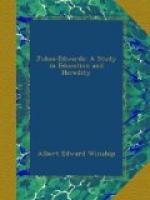Major Dwight was a merchant in Northampton, a selectman, judge of probate for sixteen years and was for several years a member of the legislature. At the time of his death, 1778, he was possessed of 3,000 acres of valuable land in Northampton, and he willed his wife $7,050, and each of his thirteen children $1,165. At that time there were but five painted houses in Northampton and but two were carpeted. Of the fourteen children, thirteen grew up, and twelve were married; and their entire family adds greatly to the glory of the family of Jonathan Edwards. The oldest son, Dr. Timothy Dwight, president of Yale, said with much tenderness and force, “All that I am and all that I shall be, I owe to my mother.” She was a woman of remarkable will power and intellectual vigor. She was but seventeen when her first child was born and was the mother of fourteen children at forty-two.
The first-born, President Timothy Dwight, S.T.D., LL.D., born 1752, was one of the most eminent of Americans. He learned his alphabet at a single sitting while a mere child, and at four knew the catechism by heart. He graduated from Yale at seventeen; taught the Hopkins school in New Haven at seventeen and eighteen; was tutor in Yale from nineteen to twenty-five years of age; wrote the “Conquest of Canada,” which was reprinted in London, at nineteen. This work was dedicated to George Washington by permission. At twenty-three, he was in the fore front of the advocates of independence. At twenty-two, General Washington appointed him a chaplain in the army, and personally requested that he accept. His widow received $350 a year pension because of this service. He was a member of the Massachusetts legislature and secured an important grant to Harvard university. He was offered a professorship at Harvard and could have gone to Congress without opposition, but he declined both, and at thirty-two accepted a country pastorate at Greenfield Hill, Connecticut. He remained there twenty-two years. His salary was $750. He also had a gift of $1,500 for accepting the call, a parish lot of six acres, and twenty cords of wood annually. This was said to be the largest ministerial salary in New England. At forty-three he was called from the country parish to the presidency of Yale. His salary as president was $334. Later he had $500, from which he paid $150 for two amanuenses which he required because his sight had




